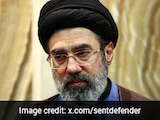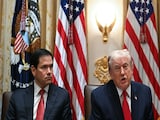India must go beyond incremental reform to radically improve ease of doing business and become an irresistible destination for global capital by seizing the opportunities created by "unintended consequences" of US President Donald Trump's tariffs, Mahindra Group Chairman Anand Mahindra has said.
He said the "law of unintended consequences" seems to be operating stealthily in the ongoing tariff war unleashed by the US but these have the potential to become long-term positives for global growth. "Shouldn't India too seize this moment to shape a virtuous consequence for itself?" he said.
Mr Mahindra's remarks came as the US President on Wednesday escalated his tariff offensive against India by slapping an additional 25 percent duty and subsequently doubling it to 50 percent on Indian goods over New Delhi's continuous imports of Russian oil.
India condemned the "unfair, unjustified and unreasonable" move that is likely to hit sectors such as textiles, marine and leather exports hard. With this action singling out New Delhi for the Russian oil imports, India will attract the highest US tariff of 50 per cent along with Brazil.
In a post on X on Wednesday, Mr Mahindra asked if today's "global 'Manthan' over tariffs (can) yield some 'Amrit' for us", just as the 1991 forex reserves crisis triggered liberalisation.
Suggesting "two strong steps" that India can take today, Mr Mahindra said, the first is to "radically improve ease of doing business". "India must go beyond incremental reform and create a genuinely effective single-window clearance system for all investment proposals. While states control many investment regulations, we can begin with a coalition of willing states aligning with a national single-window platform. If we demonstrate speed, simplicity, and predictability, we can make India an irresistible destination for global capital in a world seeking trusted partners," he said.
The industrialist also suggested that the power of tourism be unleashed as a forex engine. Tourism is one of the most underexploited sources of foreign exchange and employment, he said. "We need to dramatically accelerate visa processing, improve tourist facilitation, and build dedicated tourism corridors around existing hotspots, offering assured security, sanitation, and hygiene. These corridors can serve as models of excellence, encouraging other regions to emulate and raise national standards," he added.
He said the country must ensure liquidity and support for micro, small and medium enterprises, infrastructure investment acceleration, a manufacturing push via enhancement and expansion of the scope of Production Linked Incentive (PLI) schemes, rationalise import duties so that duty on manufacturing inputs are lowered and assist in improving our competitiveness.
"Let the unintended consequences we create be the most intentional and transformative ones of all. We cannot fault others for putting their nations first. But we should be moved to make our own nation greater than ever," he wrote on the micro-blogging site.
Mr Mahindra cited examples of the European Union (EU)'s response to the tariffs with its own strategic adjustments, and Canada, which has also taken initiatives to dismantle its internal trade barriers between provinces.
"The EU may appear to have accepted the evolving global tariff regime, responding with its own strategic adjustments. Yet the friction has nudged Europe to rethink its security dependence, leading to higher defence spending in France and Germany. In the process, Germany has moderated its fiscal orthodoxy, which may well catalyse a resurgence in Europe's major economies. The world could gain a new engine for growth," the industrialist said.
Similarly, he said, "in Canada, long hampered by notorious internal trade barriers between its provinces, steps are now being taken to dismantle them, bringing the country closer to a common market and enhancing economic resilience".
The EU has been hit by multiple waves of tariffs since Mr Trump reclaimed the White House. It was subject to a 25 percent levy on cars, 50 percent on steel and aluminium, and an across-the-board tariff of 10 percent, which Washington threatened to hike to 30 percent in a no-deal scenario. Last month, the EU and the US clinched what President Trump described as the "biggest-ever" deal to resolve a transatlantic tariff stand-off that threatened to explode into a full-blown trade war.
Earlier this month, Mr Trump signed an executive order increasing tariffs on Canadian goods to 35 percent from 25 percent on all products not covered by the US-Mexico-Canada trade agreement.















